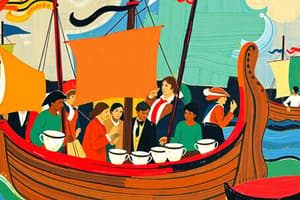Podcast
Questions and Answers
What was the main purpose of the Tea Act enacted by the British Parliament in 1773?
What was the main purpose of the Tea Act enacted by the British Parliament in 1773?
- To give the East India Company a monopoly on tea sales (correct)
- To increase taxes on tea in the colonies
- To reduce the cost of shipping tea from England
- To support colonial tea producers
How did American colonists perceive the Tea Act?
How did American colonists perceive the Tea Act?
- As a governmental gift to the citizens
- As an unfair tax on competitors (correct)
- As a way to support the colonial economy
- As a benefit to the East India Company
What was one method used by colonists to resist the Tea Act?
What was one method used by colonists to resist the Tea Act?
- Starting a tea company
- Organizing a boycott of all imported goods
- Writing petitions to the British Parliament
- Threatening ships with violence (correct)
What was the Boston Tea Party?
What was the Boston Tea Party?
Which group was responsible for organizing the protest resulting in the Boston Tea Party?
Which group was responsible for organizing the protest resulting in the Boston Tea Party?
Study Notes
Tea Act of 1773
- Enacted by British Parliament, aimed to grant East India Company monopoly over tea in American colonies.
- Intended to allow East India Company to sell tea at lower prices, eliminating competition.
- Prior to the act, the company faced taxes upon tea's arrival in England and additional tariffs upon reaching America.
Colonial Response
- American colonists perceived the act as a tax favoring the East India Company and stifling other tea sellers.
- Significant public outcry and rebellion emerged post-passage of the Tea Act.
- Colonists took action by either rejecting tea shipments or threatening merchants with violence.
Sons of Liberty and the Boston Tea Party
- Sons of Liberty played a pivotal role in opposing the Tea Act and advocating for colonists’ rights.
- On December 16, 1773, in a bold act of defiance, members disguised themselves and boarded ships in Boston Harbor.
- Over ninety thousand pounds of tea were destroyed in a demonstration now known as the Boston Tea Party.
Studying That Suits You
Use AI to generate personalized quizzes and flashcards to suit your learning preferences.
Description
Explore the implications of the Tea Act of 1773, enacted by the British Parliament. This quiz delves into the historical context and the reactions of American colonists to the East India Company's monopoly on tea sales. Test your understanding of this pivotal moment in American history.



